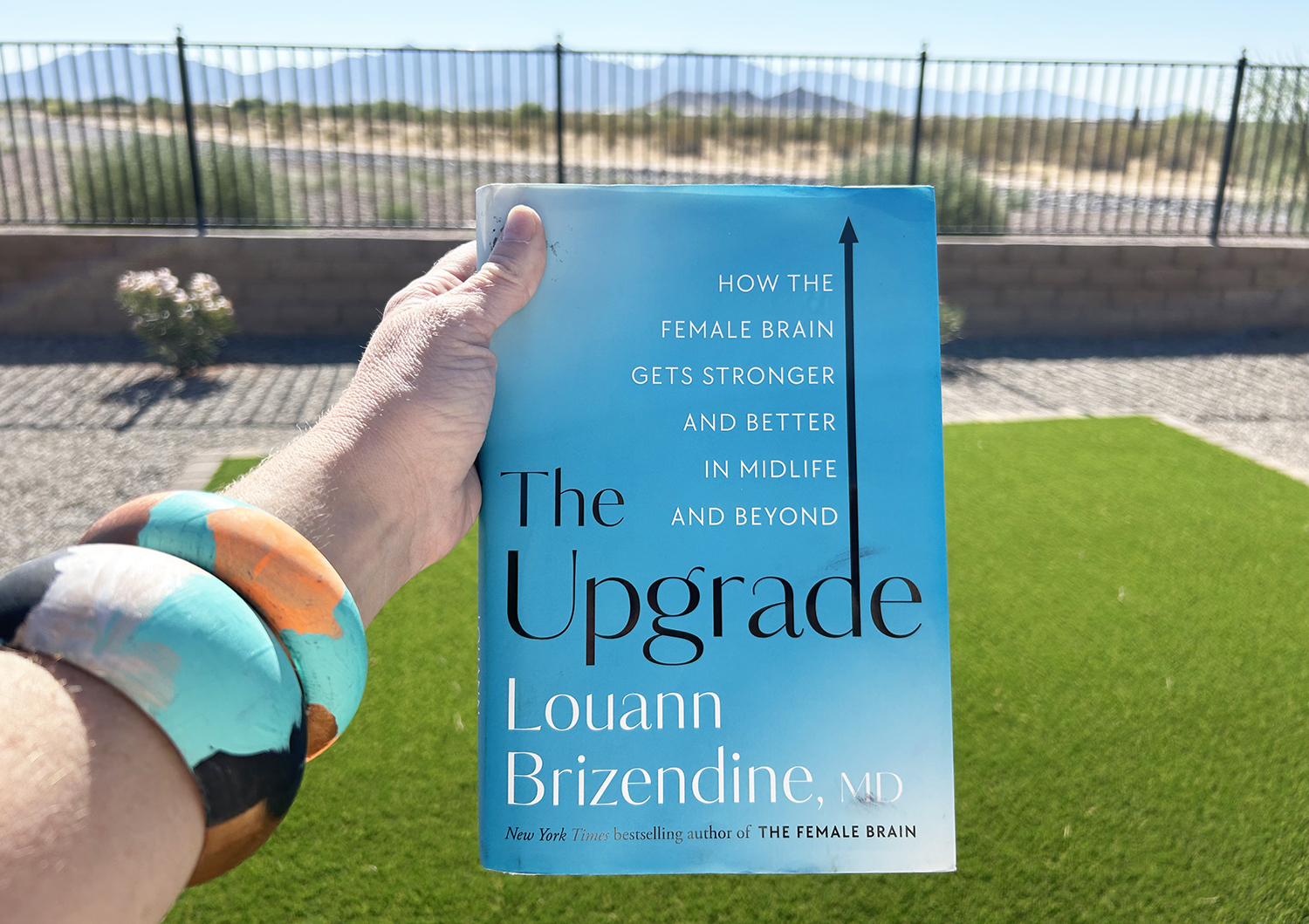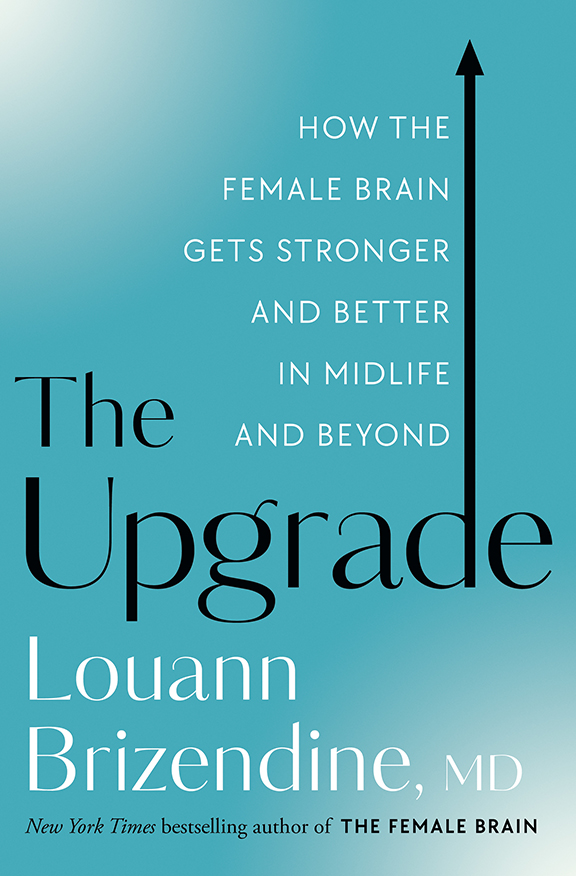
Screw over the hill. Women’s brains are upgraded after menopause
Have you seen Courtney Cox’s spoof on her 1985 Tampax ad? Now 59, she says, “Menopause will eat you alive! … Plus, you get the added bonus of drier skin and bald patches.”
Jokes aside, Cox makes a valid point: Menopause can be f-ing hard. But there’s also a bright side, says Dr. Louann Brizendine, MD, in her book, The Upgrade: How the Female Brain Gets Stronger and Better in Midlife and Beyond. Now that I’m several years into my perimenopause experience, I more than welcome the benefits and upsides of entering our second phase of life.
“The Upgrade” is Dr. Brizendine’s new term for menopause — one that’s about the path to becoming your best deep self. “Maybe it’s a bit grandiose, but if not now, when?” The Upgrade delves into doubts and misinformation about aging in order to help women find our own answers and solve conflicts about how emotions, hormones, biology, and the brain work together.

Who is Louann Brizendine?
Dr. Louann Brizendine MD is a neuropsychiatrist who was among the first to explain why women think, communicate, and feel differently than men in her previous bestseller, The Female Brain.
Inspired by her own experiences and of the thousands of women at her clinic — Women’s Mood and Hormone Clinic at UCSF — Brizendine’s identification of the good in menopause is groundbreaking. During menopause, she says, women’s brains are reshaped in a way that creates new power, much-wanted clarity, and a laser-like sense of purpose. It’s up to us to seize the opportunity.
Repositioning is everything
As a medical doctor who’s been there, done that with menopause, Brizendine declares a revolution on terminology sorely in need of reframing. “Perimenopause and menopause are fossil words created by men at pharmaceutical companies. These words arose not because of an interest in helping women reach The Upgrade, which is a whole-person explosion of growth and realization of potential,” she writes.
How Brizendine redefines perimenopause and menopause
“The Transition” aka perimenopause
The developmental phase of a woman’s life in which the brain and body enter unfamiliar territory as the reproductive phase circuits are finishing their job. This is the phase formerly know as perimenopause. The Transition into the Upgrade can make an already wild fight for homeostasis even more dramatic. Not every woman will experience the shift in the same way, but for the 30% who go through a dramatic version of the Transition, the wild push-pull of this neurochemical storm lasts between two and 14 years.
“The Upgrade” aka menopause
The Upgrade is the wisdom phase that emerges after a woman spends decades in the “hormonal war zone.” Emerging into the most powerful identity phase of a woman’s life, this is what was formerly known as menopause or post-menopause.
How exactly do women get better with age?
Brizendine elegantly weaves together research about human chemistry with real-life examples depicting how women’s brains are poised for upgrades post-menopause. “We receive so many messages about our supposed irrelevance in the second half of life that I’ve decided it’s time to punch through,” she writes. “The more you know about neurochemicals, brain circuits, and the neurons throughout the body, the greater your chances of breaking out of old patterns to create a new life.”
After studying the latest research, Brizendine has found that in midlife the inclination to cater to the needs of others often chills out, allowing women to become more centered. During The Upgrade, the change in ratio of estrogen to testosterone makes women more direct and able to speak up. There’s also a drop in anxiety that allows the female brain to flip its attentional style from multitasking to focusing on one thing at a time. The upgraded female brain is direct, fearless, and free. Amen to that.

The science behind not giving a f***
As the publisher of The Midst, I’ve heard time and again from women in midlife that they’re finally giving less fucks about what people think about them. In The Upgrade, Brizendine explains why we give too many fucks about people-pleasing during puberty and our prime fertility years.
“The ability to surf those waves in the midst of neurochemical storms is reflected in female psychology as the core of our courage, our strength, our will, our agency, our power. The waves cause just enough suffering to help us connect with our best qualities. The dance of youth, of hormones that trapped us in the arena of nonstop acquisition — marriage, children, career, money — ends when the ovaries go deaf to the brain’s demanding signal for estrogen, testosterone, and progesterone.”
Brizendine goes on to explain that the crashing of those dramatic waves is wiping the hard drive to prepare it for The Upgrade, “a state that can quiet the brain’s hypervigilance around survival, kids, and relationships and remove the filters of worry over how we appear to others. When you pass through the door to The Upgrade, your ability to see your most positive and authentic self is no longer clouded. You’ve walked through fire to come into your true power.”
Brizendine’s questions to ask yourself in perimenopause
- Who do you want to be today? Who do you want to be in your transition and beyond?
- Who do you want to be as you enter the fullness of your age? Is it a leader, an artist, a visionary, a mentor and sponsor? Is it a life filled with freedom, purpose, and focus unencumbered by the responsibilities of an earlier time?
This article was originally published here on The Midst Substack in July 2023.



